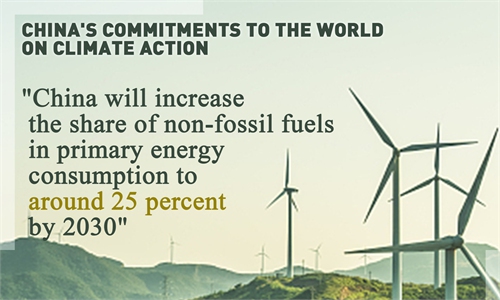Climate management should not be politicized; scientific innovation to meet challenges in realizing carbon neutrality: top environmental researcher

Photo:VCG
Climate change is a global challenge that should not be politicized and calls for international collaboration, said the chief at China's top environmental institute, noting that on the way to achieve the country's carbon goals, scientific innovation will face challenges with more efforts and costs.
China's carbon goals have lifted global confidence in confronting climate change, but there are still some Western factions and media outlets that describe China's efforts as a distraction from other issues.
In a recent exclusive interview, Li Haisheng, president of the Chinese Research Academy of Environmental Sciences, told the Global Times that, "The practice of politicizing the climate issue is not conducive to global climate cooperation."
He believes such views do not represent the views of the mainstream of the Western public and governments. "Climate change is a global challenge that requires all countries to work together and cope with it under the common but differentiated principle," Li, also the former director of the Department of International Cooperation in China's Ministry of Ecology and Environment (MEE) said.
Li believes the voices to be the "growing pains" of China's development. "We need to maintain our strategic determination and focus on our own work steadily. In the end, the world will give us a fair evaluation".
In the process of confronting climate change, developing countries should seek a different way as compared to that taken by developed countries.
Li went further by stating the global greenhouse gas emission in history.
Developed countries first enjoyed the rapid development, and then sought to treatment and transfer pollution after the ecosystem been destructed and the environment been polluted, while developing countries could only take over polluting industries in order to rise from poverty, Li said.
But the whole world has a shared future for all life on earth. He quoted Friedrich Engels as saying, "Let us not, however, flatter ourselves overmuch on account of our human victories over nature. For each such victory nature takes its revenge on us."
The modernization process of most member states of Organisation for Economic Co-operation and Development (OECD) followed the route of "polluting, managing, then transferring." But times have changed. China and other developing countries such as India can no longer follow this model.
Carbon peaking and carbon neutrality are not only issues of emission reduction and the environment. Carbon credits involve a right to development, which contains major opportunities and China's strategic consideration of green development, Li said.
To achieve carbon peak and carbon neutrality, the pressure China faces is much greater than that of the 38 OECD countries combined.
China has a population of 1.4 billion, which is equivalent to the population of 38 OECD countries; however, the current per capita GDP of China is less than one third of the OECD countries, Li said.
The pressure comes from continuous industrialization and urbanization, as well as uneven regional development. Energy safety, food safety, ecology and, economic security, as well as social development should also all be comprehensively considered in the process, he noted.
OECD countries began to achieve carbon peaks once they had achieved development, while China has just achieved a "well-off" status in the process of industrialization and has yet to achieve carbon peaks. Moreover, China has only 30 years between carbon peak to carbon neutrality, the shortest in the world.
China declared at the General Debate during the 75th Session of the UN General Assembly that the country aims to hit CO2 emissions peak before 2030 and to achieve carbon neutrality before 2060.
"In this context, China's carbon peaking and carbon neutrality require more effort and cost than developed countries," Li said. "It also requires scientific and technological innovation to promote a 'green revolution' in energy, industry, and governance concepts."
China's environmental protection strategy will shift from ultra-low emission transformation to the development of new energy sources and the use of non-fossil energy; pollution control will pay more attention to source control, whole-process governance, and new pollutants control.
In terms of government management, the legalization work on confronting climate change should be accelerated. Emission reduction should be included into the official assessment system in local regions, along with GDP and other items.
Li also called for exchanges and cooperation in the field of environmental technologies. "Developed countries should show their responsibilities in sharing low-carbon technologies and provide financial and technical supports to developing countries, while developing countries need to embrace the support with a more positive and more open attitude. Science knows no country. Nor does the science and technology that tackle climate change.
China has also helped other developing countries in confronting climate change through the Green Belt and Road Initiative by building up platforms, aiding infrastructural constructions, and maintaining talent.
Talking about the cooperation between China and the US on climate issues, Li urged the two big powers to build a "Noah's Ark" confronting climate change.
China and the United States have carried out fruitful cooperation in response to climate change, of which The US-China Joint Statement Addressing the Climate Crisis released in April is the most recent achievement. "The cooperation in the area will bring more positive signs to China-US relations," Li said.
The Chinese Research Academy of Environmental Sciences, established in 1978, conducts scientific and international cooperation activities which support the country's overall environmental protection aims. It has 15 research departments, two state key laboratories and nine ministerial laboratories, focusing on the atmosphere, water, soil, and solid waste, ecology, cleaner production, vehicle emission control, environmental engineering, environmental safety, and environmental standards.




